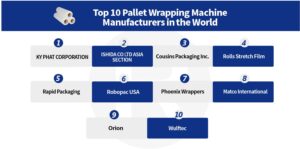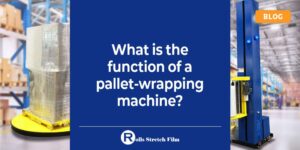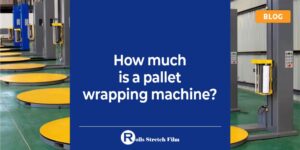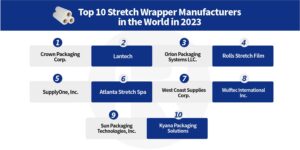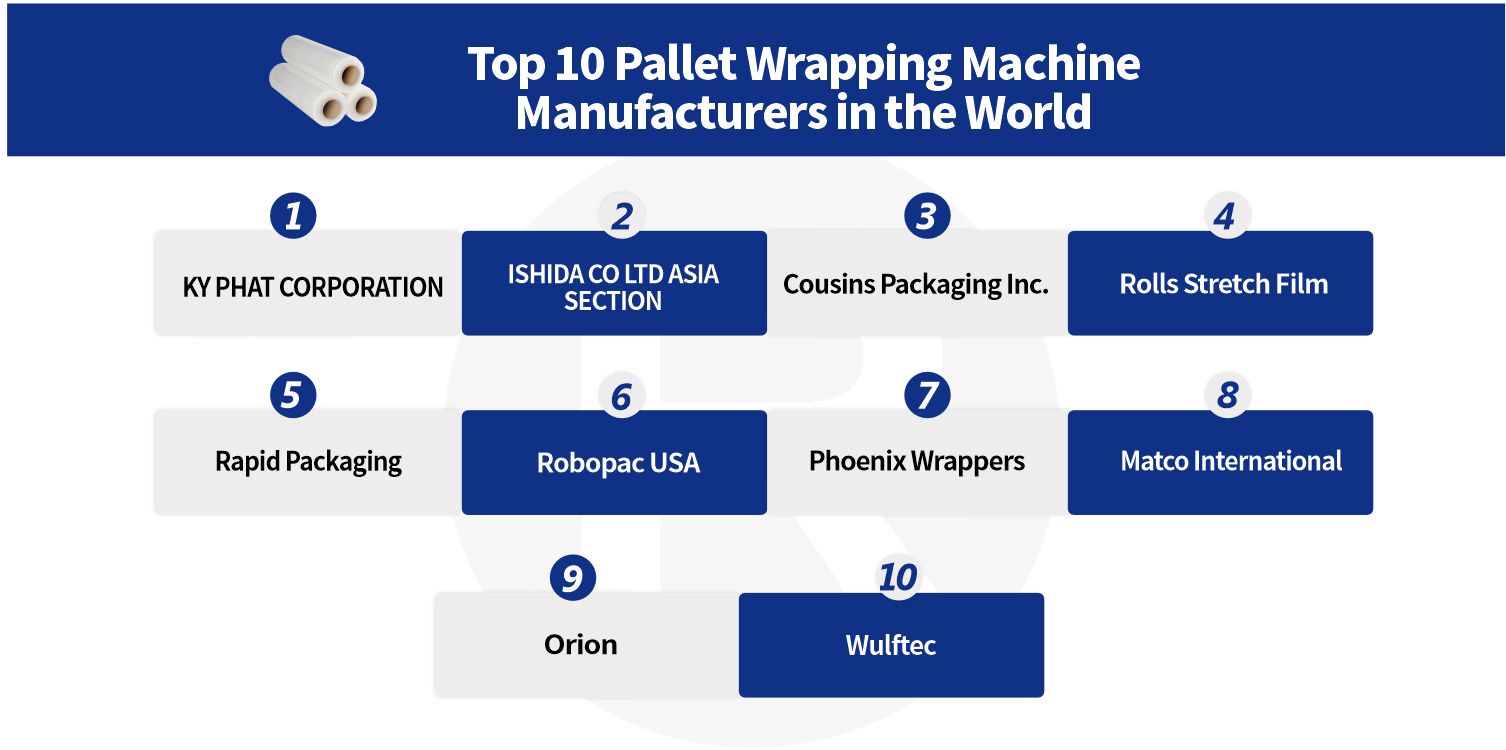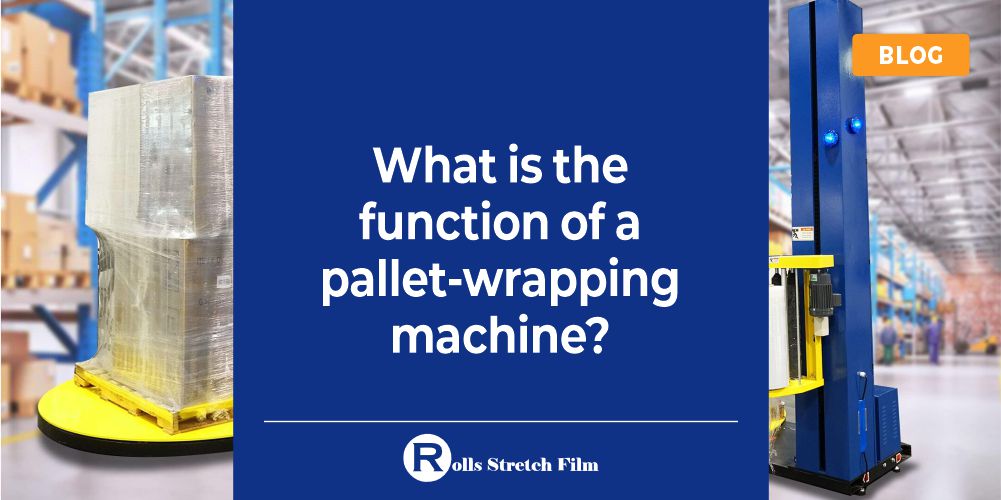In today’s fast-paced supply chain industry, the pallet wrapping process plays a crucial role in ensuring the safe transportation of goods. As a result, companies are constantly seeking ways to improve the efficiency and effectiveness of this process.
Innovative pallet wrapping solutions can save companies time and money while ensuring their products are transported safely. Research and development play a vital role in driving these innovations, with new technologies constantly being developed to make the process more efficient and effective.
In this article, we explore the role of research and development in driving innovation in the pallet wrapping industry.
1. Introduction

Explain the significance of pallet wrapping in the manufacturing industry
Pallet wrapping is a crucial process in the manufacturing industry as it ensures that products are securely and safely transported from one location to another. It involves wrapping products on a pallet with a stretch film to hold them in place, protect them from damage, and prevent them from shifting during transport.
Discuss the current state of the pallet wrapping technology
The current state of the pallet wrapping technology is characterized by a range of innovative solutions designed to improve the efficiency and effectiveness of the pallet wrapping process. One of the most notable advancements in recent years has been the development of stretch wrapping machines, which automate the pallet wrapping process and provide greater consistency and accuracy.
These machines use sophisticated sensors and software to ensure that the stretch film is applied evenly and securely, reducing the risk of damage to products during transport. In addition, to stretch wrapping machines, there is a range of other technologies that are being used to improve pallet wrapping.
For example, there are now specialty stretch films available that are designed to provide additional protection for fragile or high-value products. There are also pre-stretched films available that require less energy to apply, reducing the environmental impact of the pallet wrapping process.
There has been a growing interest in sustainable pallet wrapping solutions in recent years. This has led to the development of biodegradable and compostable stretch films, as well as alternative pallet wrapping materials such as paper and reusable straps.
These eco-friendly solutions are gaining popularity among companies that are looking to reduce their environmental footprint while still ensuring the safety and security of their products during transport.
Preview the topics covered in the essay
This essay explores the role of research and development in driving innovation in the pallet wrapping industry. The essay will cover a range of topics including the significance of pallet wrapping in the manufacturing industry, the current state of pallet wrapping technology, and the latest trends and developments in pallet wrapping.
Additionally, the essay will discuss the impact of pallet wrapping on supply chain efficiency, the benefits of automated stretch wrapping machines, and the growing interest in sustainable pallet wrapping solutions.
2. Automation and Robotics in Pallet Wrapping
Pallet wrapping process comparison table
| Process | Description | Advantages | Disadvantages |
|---|---|---|---|
| Manual wrapping | The operator wraps the pallet by hand using a roll of stretch film. | Low initial cost. Flexible and adaptable to different load sizes and shapes. | Time-consuming and labor-intensive. Inconsistent and unreliable wrapping quality. High risk of injury and fatigue for the operator. High film consumption and waste. |
| Semi-automatic wrapping | The operator places the pallet on a turntable and attaches the film to the load. The machine wraps the pallet automatically while the operator controls the parameters. | Faster and more efficient than manual wrapping. Consistent and reliable wrapping quality. Reduced risk of injury and fatigue for the operator. Reduced film consumption and waste. | Higher initial cost than manual wrapping. Requires electricity and maintenance. Limited by the turntable size and weight capacity. |
| Fully automatic wrapping | The pallet is conveyed to a wrapping station where it is wrapped automatically without any operator intervention. The machine cuts and seals the film at the end of the cycle. | Fastest and most efficient wrapping process. Consistent and reliable wrapping quality. No risk of injury and fatigue for the operator. Reduced film consumption and waste. Suitable for high-volume and high-speed applications. | Highest initial cost among all processes. Requires electricity, maintenance, and integration with conveyor system. Less flexible and adaptable to different load sizes and shapes. |
Describe the benefits of automated pallet wrapping systems
Some of these benefits include:
- Increased efficiency: Automated systems can wrap pallets faster and more consistently than manual methods, reducing the time and labor required for the pallet wrapping process.
- Improved consistency: Automated systems can apply the stretch film more evenly and securely than manual methods, reducing the risk of damage to products during transport.
- Reduced waste: Automated systems can use stretch film more efficiently, reducing the amount of film required and minimizing waste.
- Improved safety: Automated systems can reduce the risk of workplace injuries by eliminating the need for workers to handle heavy pallets and stretch film.
- Cost savings: Over time, automated systems can provide cost savings by reducing the amount of labor required for the pallet wrapping process and minimizing the amount of stretch film used.
Explain how robotics is changing the pallet wrapping landscape
Robotics is changing the pallet wrapping landscape by introducing new levels of automation and sophistication to the pallet wrapping process. Specifically, robotics technology is being used to develop autonomous pallet-wrapping robots, which can wrap pallets faster, more consistently, and more efficiently than traditional methods.
Autonomous pallet-wrapping robots use advanced sensors and software to apply stretch film to pallets automatically. These robots are designed to wrap pallets with a high degree of accuracy and consistency, reducing the risk of damage to products during transport.
Include examples of innovative new solutions
- Pallet Wrapping Robots: Autonomous pallet wrapping robots are becoming increasingly popular in the industry. These robots can automatically wrap pallets with a high degree of accuracy and consistency, reducing labor costs and improving efficiency.
- Pre-Stretched Films: Pre-stretched films are a new type of stretch film that has been pre-stretched during the manufacturing process. This reduces the amount of energy required to wrap a pallet and can help to reduce waste.
- Alternative Wrapping Materials: Some companies are experimenting with alternative wrapping materials, such as paper or reusable straps, to reduce their environmental impact and improve sustainability.
- Intelligent Stretch Wrappers: Intelligent stretch wrappers use sensors and software to monitor the wrapping process and adjust the stretch film tension in real time. This ensures that the pallet is wrapped securely while minimizing the amount of film used.
- Robotic Stretch-Wrapping Arms: Robotic stretch-wrapping arms are an innovative solution that combines the benefits of robotics with the flexibility of a human operator. These arms can be programmed to wrap pallets automatically, but can also be manually operated for more complex pallets or unique situations.

3. The Role of Manufacturers in Pallet Wrapping Technology
Discuss the importance of manufacturers in the development of pallet wrapping technology
As the primary users of pallet wrapping equipment, manufacturers provide valuable feedback and insights into the performance, reliability, and efficiency of pallet wrapping technology systems. This feedback is critical for the development of new and improved pallet wrapping technology that meets the specific needs of manufacturers.
Manufacturers are also key drivers of innovation in the industry. Many manufacturers invest heavily in research and development, working closely with equipment suppliers and technology providers to develop new and improved pallet wrapping solutions.
Highlight the need for investment in research and development
Investment in R&D is critical for ensuring the continued growth and success of the pallet wrapping industry. Without ongoing innovation and development, the industry risks falling behind and becoming less competitive, while manufacturers may face higher costs, increased waste, and reduced efficiency in their supply chain operations.
Demonstrate the significance of cost-effectiveness and ease of use
Cost-effectiveness is essential because it directly impacts a company’s bottom line. By investing in cost-effective pallet wrapping technology, manufacturers can save money and increase their profitability.
Ease of use is also critical for manufacturers. Complex or difficult-to-use pallet wrapping systems can cause delays, errors, and frustration among employees, ultimately reducing productivity and efficiency.
Pallet wrapping process innovation table
| Innovation | Description | Benefits |
|---|---|---|
| ARYA system | A new technology that makes the semi-automatic wrapping process fully automatic by blowing the stretch film against the pallet and cutting it automatically without any operator intervention. | Easy installation, time and cost saving, ergonomic solution, more automation, less human exertion. |
| HexcelStretch™ system | A 100% paper-based pallet wrapping system that uses high-tension PowerStretch™ technology to secure the load with minimal material usage. | Cost-effective, sustainable, fully-recyclable, plastic-free, biodegradable, compostable, easy to apply and remove, high load stability, water and dust protection. |
4. The Impact of Automated Pallet Wrapping on the Manufacturing Industry
Outline the potential benefits of automated pallet wrapping technology for manufacturers
Automated pallet wrapping technology offers numerous benefits for manufacturers, including:
- Improved efficiency: Automated systems can wrap pallets much faster than manual methods, reducing the time required to complete this task and freeing up employees to focus on other critical tasks.
- Consistency and reliability: Automated systems can apply consistent tension and wrapping patterns, resulting in more uniform and reliable pallet wraps, minimizing the risk of product damage during transport.
- Reduced film usage: Automated systems can use advanced film-saving features, such as pre-stretched films and film tension control, to reduce the amount of film required for each wrap, reducing material costs and environmental waste.
- Improved safety: Automated systems can help to reduce the risk of employee injury associated with manual pallet wrapping, minimizing the risk of repetitive motion injuries and accidents.
- Better quality control: Automated systems can integrate with other quality control measures, such as barcode scanning and product weight verification, to ensure that each pallet is wrapped correctly and that the correct products are shipped to customers.
- Reduced labor costs: Automated systems can help to reduce the need for manual labor, minimizing labor costs and allowing employees to focus on more critical tasks that require human intervention.
Discuss how automated pallet wrapping can help companies streamline operations, reduce costs, and improve efficiency.
Automated pallet wrapping systems can help companies streamline their operations, reduce costs, and improve efficiency in several ways such as faster and consistent wrapping, reduced film usage, improved safety, better quality control, and reduced labor costs.
Explain how the technology can result in reduced waste and improved product protection during transport.
Automated systems can use advanced film-saving features, such as pre-stretched films and film tension control, to reduce the amount of film required for each wrap. This can significantly reduce material costs and environmental waste.
Automated systems can also be programmed to apply different wrapping patterns, tension levels, and film types based on the specific needs of the product being transported. This allows companies to customize their pallet wrapping process to provide the best possible protection for their products, reducing waste and improving customer satisfaction.
5. final thoughts on the future of pallet wrapping technology
The future of pallet wrapping technology is promising, with innovations and advancements emerging regularly. As more companies recognize the benefits of automated pallet wrapping systems, we can expect to see continued growth and development in this area.
In the coming years, we can expect to see further advancements in robotics, automation, and AI technology, which will enable companies to further streamline their operations and increase efficiency. Additionally, we can expect to see continued progress in sustainability, with companies adopting more eco-friendly materials and practices to reduce waste and minimize their impact on the environment.

Pallet wrapping technology has come a long way, with automated systems offering significant benefits to manufacturers. As research and development continue, we can expect to see further advancements in this area, leading to improved efficiency, cost-effectiveness, and sustainability.


